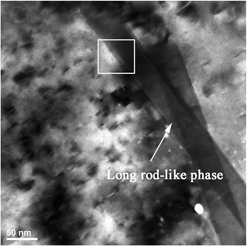Article contents
Effect of mold temperature on microstructure and mechanical properties of rheo-squeeze casting Mg–3Nd–0.2Zn–0.4Zr alloy
Published online by Cambridge University Press: 24 October 2017
Abstract

The effect of mold temperature on microstructure and mechanical properties of a rheo-squeeze casting (RSC) Mg–3Nd–0.2Zn–0.4Zr (NZ30K) alloy were investigated. The results indicated that the rise of mold temperature contributed to the increase of particle size and alloy density and the decrease of dislocation density. The rapid coarsening and then the normal growth of the particles during solution treatment were observed, and the long-rod-like Zn2Zr3 phase occurred. After age treatment, rod-like β′ precipitate was found in the conventional squeeze casting (CSC) alloy, while two types of precipitates including β′ phase and small plate-like β″ phase were observed in the RSC alloy. The amount of Zn2Zr3 phase was increased with rising mold temperature. Compared with the T6-treated CSC sample, the T6-treated RSC sample presented higher mechanical properties due to the larger precipitation strengthening contribution, and the yield strength, ultimate tensile strength, and elongation were up to 160 MPa, 296 MPa, and 7.7%.
- Type
- Articles
- Information
- Copyright
- Copyright © Materials Research Society 2017
Footnotes
Contributing Editor: Jürgen Eckert
References
REFERENCES
- 8
- Cited by



